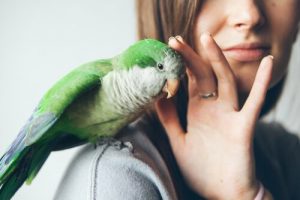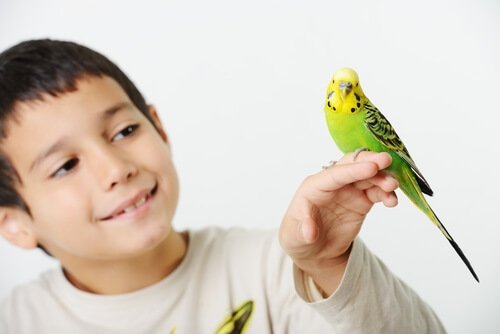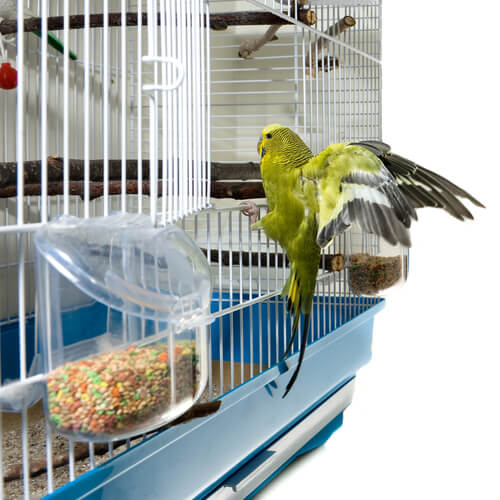Deworming Your Pet Bird

Birds are sensitive to and can be easily harmed by different pathogens and allergens. Pet birds need proper preventative medicine and good hygiene in order to be healthy.
The most common parasites in pet birds
As mentioned above, several internal and external parasites can affect pet birds. Despite their small size, these creatures can cause numerous illnesses and serious damage to the health of all pets.
Below, is a list of the most frequent parasites in canaries and other pet birds.
- Worms: Internal parasites, generally called worms or maggots, that get lodged mainly in the digestive system of their hosts. They usually reach the bloodstream and spread to other organs.
By sucking the animal’s blood, the worms get the nutrients they need to reproduce and complete their life cycle. This causes weight loss, nutritional deficits, and frequent diarrhea. In more severe cases, the bird has a case of malnutrition and anemia that can become lethal.
- Mites: Mites are tiny arthropods that are considered ectoparasites. They are parasites that get lodged on the outside of the host’s body. They are usually nocturnal animals that hardly ever get noticed and they live on the animal’s body for years.
Mites are not harmless, and tend to cause itching, feather loss, allergies, and scabies. In addition, it’s common for birds to mutilate themselves while trying to alleviate the itching in their skin and plumage.
- Lice: are also small insects that act like ectoparasites and often affect birds and mammals. In order to suck an animal’s blood, they make small wounds that cause intense itching, skin redness, and eventual feather loss.

Tips for deworming pet birds
- Choose excellent quality antiparasitic products. You can find a large variety of bird antiparasitic products in pet stores. Ideally, you should choose a special spray for the species of bird you have.
Sprays are easier and safer to apply than powders and ointments. There are oral antiparasitics that fight internal parasites, and purge and protect their digestive systems.
- Seek advice from an expert veterinarian. To efficiently deworm your bird, you should follow the directs of a veterinarian who is an expert in birds. He/she will not only check your pet’s health, but they will also recommend products that are good for your bird’s needs.
- Prevention. Although periodic deworming is indispensable for a bird’s health, prevention is always the best solution.
To keep parasites away from your birds, you must constantly practice good hygiene habits, provide your bird with a nutrition diet, and provide them with a stimulating environment. Also, taking your bird to the vet’s on a regular basis is important for keeping your bird healthy and diagnosing any diseases at an early stage.

Home remedies for deworming your pet birds
Currently, at many pet stores, there are some excellent products that are good for deworming your pet bird.
However, you can also use natural home remedies to fight against internal and external parasites.
- Apple cider vinegar: Vinegar is one of the most widely used home remedies, because of its potent antiseptic and insecticide effects. For those who prefer to deworm their pets with natural remedies, then you should try apple cider vinegar.
To use apple cider vinegar on your bird, mix it with an equal portion of clean, fresh water. Then pour it into your bird’s water trough.
- Pumpkin seeds: pumpkin seeds are one of the best natural remedies for internal parasites. Eating this food regularly is effective for preventing and eliminating endoparasites in the gastrointestinal tract.
The fibers in these seeds are great for improving bowel movements and preventing constipation. Before feeding them to your bird, it’s important to dry them in the sun first and remove the shell. Ideally, you should mash them and mix them into your bird’s food, so they can be digested more easily.
- Baking soda. Sodium bicarbonate is another potent antiseptic and natural antiparasitic. Since canaries and other birds love to cool off and clean themselves, you can mix a teaspoon of baking soda into their bathtub. In addition, you should use baking soda to clean your bird’s cage and accessories.
This text is provided for informational purposes only and does not replace consultation with a professional. If in doubt, consult your specialist.